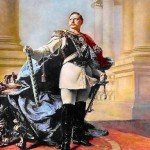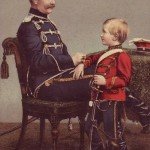
Kaiser Wilhelm II was the monarchical ruler of Germany from June 1888 until its 1918 defeat in World War I. Many historians consider Wilhelm the individual most responsible for the outbreak of war – as much as one individual can be. Opinions about this do vary, nevertheless there is a consensus that Wilhelm II’s brash, ambitious and aggressive leadership was a critical factor. His imperialistic and nationalistic agenda in the late 1800s and early 1900s fuelled pre-war diplomatic tensions, while his careless advice to Austria-Hungary during the July Crisis of 1914 was a major factor in the outbreak of war.Wilhelm was born in Berlin in 1859, the first son of Frederick, heir to the Prussian throne, and Victoria, the eldest daughter of Queen Victoria of England. His entry into the world was by a troublesome breech birth (feet rather than head first); this left him with a congenital shoulder condition and a withered left arm, slightly shorter than the right. These disabilities caused the young prince some physical discomfort, though he was more troubled by the embarrassment (he would spend most of his adult life concealing his disfigured arm). Wilhelm’s early years were spent under the ferocious discipline of a military tutor, who applied strict punishments for his minor errors but no praise or encouragement for his successes. As a teenager Wilhelm showed a quick mind and an aptitude for history and the sciences, however he was also stubborn, arrogant, moody and prone to frightening outbursts and tantrums. He was given training as a cavalry officer, a typical education for a scion of the Prussian aristocracy.
The young Wilhelm showed much admiration for the British and their empire. As a young man he paid several visits to England and to his grandmother, Queen Victoria. He was especially captivated by the size and firepower of England’s Royal Navy, telling the Prince of Wales – the future Edward VII – that one day he hoped to “have a fleet of my own”. In his teenage years Wilhelm’s relationship with his English mother deteriorated, as did his affection for England and its people, who he grew to distrust. He began to blame his mother for his own problematic birth, cursing her choice of a “clumsy” English obstetrician. His relationship with Queen Victoria also soured: the young prince later described her as an “old hag”, while Victoria in turn told one of her ministers that Wilhelm was a “hot-headed, conceited and wrong-headed young man”.

The 29-year-old Wilhelm was crowned in 1888 following the death of his father, who had ruled for barely three months. His ascension to the throne marked a new direction in Hohenzollern rule. Wilhelm’s grandfather, Wilhelm I (1861-88) had for the most part been a symbolic monarch, leaving political decisions to his advisors, particularly Otto von Bismarck. The young kaiser’s own parents had been liberal-minded progressives, who favoured a British-style system of government with the monarch advised by a cabinet of ministers. But the arrogant young kaiser was unwilling to impose limits on his own power: he viewed himself not only as head of state, but also as head of the government. This determination to intrude into policy formation brought the young monarch into dispute with the ageing Bismarck; after two years of tension and conflict Bismarck was pensioned off. Future chancellors would be chosen by Wilhelm himself, so proved much less obstinate.
“Kaiser Wilhelm II was a bafflingly complex person. The caricature of the saber-rattling warrior, he broke down when war actually began. Endowed with a high intelligence and an excellent memory, he was capable of the most crashing stupidities. Fascinated by the latest technology, thoroughly at home in a fast-moving modern world, Wilhelm clung to medieval notions of divine right. Enormously energetic and ambitious, he proved utterly unable to work hard. The contradictions were so numerous and startling that before Wilhelm had spent two years on the throne, people wondered if he were quite sane.”
Isabel V. Hull, historian
Wilhelm II’s main interest was foreign policy, particularly the power, prestige and size of the German Empire. He envisioned a German-speaking empire that rivalled the size and commercial power of the British. Not only that, he wanted to play a personal role in its construction and its management. But Wilhelm’s strong-willed and impatient personality was desperately unsuited to matters of diplomacy and foreign policy. Several of his outspoken comments and misjudgments fuelled European tensions in the decade prior to World War I. Notoriously racist, his remarks about “cross-eyed” Chinese after the Boxer Rebellion raised eyebrows around the world. A poorly-timed state visit to Morocco in 1905 heightened suspicions in France and contributed to the signing of an Anglo-French alliance. In 1908 Wilhelm gave an interview to a London paper, a step he hoped would strengthen the Anglo-German relationship – but his remarks during the interview were full of gaffes and undisciplined rants, including bitter criticisms of the English government and other European leaders. This only added to the public perception of Wilhelm as an out-of-control, power-drunk madman who was desperate for confrontation and war.

1. Wilhelm II was a Hohenzollern royal and the kaiser (emperor) of Germany from 1888 to the end of World War I.
2. Born with a slight physical deformity, Wilhelm endured a difficult childhood that rendered him insecure and anxious.
3. Wilhelm was a man of some intelligence but could be lazy, stubborn, short-tempered and intolerant of other views.
4. An admirer of Britain, its naval strength and its empire, Wilhelm also envied these things and sought them for Germany.
5. Wilhelm’s ascension to the throne in 1888 and his displacement of Bismarck caused a radical shift in foreign policy, as Germany became more ambitious, assertive and aggressive, both in her imperial position and her military preparations.
© Alpha History 2014. Content on this page may not be republished or distributed without permission. For more information please refer to our Terms of Use.
This page was written by Jennifer Llewellyn, Jim Southey and Steve Thompson. To reference this page, use the following citation:
J. Llewellyn et al, “Kaiser Wilhelm II” at Alpha History, https://alphahistory.com/worldwar1/kaiser-wilhelm-ii/, 2014, accessed [date of last access].
